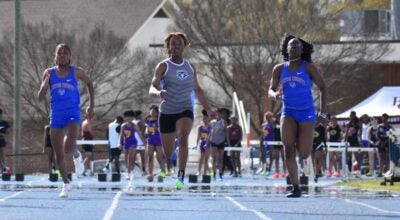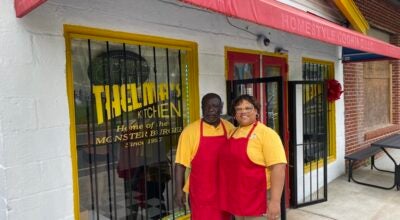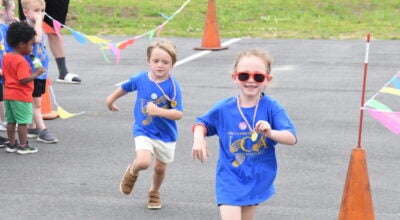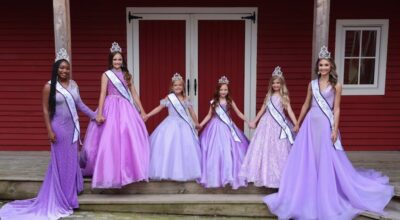Cancer diagnosis at age 22 (community correspondent)
Published 9:51 am Monday, October 12, 2015
I waited four days for the news that would change my life forever. I’ll never forget it was 10 a.m. on a Tuesday. The phone rang, and it was the surgeon himself! I remember thinking, oh no, this can’t be good! He told me that my biopsy results showed that I had something…carcinoma. I knew carcinoma meant cancer, so after hearing that word I didn’t hear another word he said. I admit, I cried some, but then I looked at my precious son and I knew I would have to fight the biggest fight of my life!
After several weeks, lots of doctor visits, lots of tests, lots of studying and lots and lots of prayers, we finally had a treatment plan. The first step was a lumpectomy, followed by 21 treatments of chemotherapy and 48 treatments of radiation. My cancer was seven centimeters, which is very large. I had invasive ductal carcinoma, and it was a Stage 4 cancer. I was so young and so scared, but fortunately, I have a wonderful husband who stood by my side and was strong for me even when I wasn’t. I also had a God that I prayed to daily. Together, we were determined that I would overcome this ugly monster called cancer!
I did overcome that battle. I lived cancer-free for eight years. After all the chemo I had, the doctors told me I would never have any more children, but my God had different plans for me. I now have four beautiful children and have been blessed way more that I deserved or expected!
Over the course of my cancer-free eight years, I went yearly to my cancer doctor to have blood tests and mammograms done. Sometimes, I would have to have an ultrasound, but not every time. In my eighth year of being a survivor, I had my fourth child. For the second time in my life, I received horrible news at my six-week checkup. My doctor convinced me to have a breast MRI done. He said something was just telling him I needed to have this done, and he probably saved my life! We both now know it was God’s intervention. Before that day I had never even heard of a breast MRI. Sadly, the MRI showed that my cancer had returned. My second battle was beginning!
In the beginning, my second battle was a lot like my first. Only this time I was not scared at all! Whatever God had in store for me, I was ready. I went through the same tests that I did before: biopsy, mammogram, ultrasound, etc. We decided to do another lumpectomy, but this time the results were very different. They could not get clear margins, and I had not one but two different kinds of cancer in that breast and it had spread throughout the breast. We knew then that my breast had to be removed.
I decided that if I had to have one removed, I would go ahead and have them both removed. I studied a lot and talked to several other survivors before I made the decision of which surgery would be best. I also prayed to God a whole lot! Every time I tried to make a decision, something would happen to change my mind. It was like God was shutting every door I tried to open. I was left with only one option.
On June 5, 2009, (my 10-year wedding anniversary), I had a bilateral mastectomy. My recovery time was about eight weeks because I had reconstruction at the same time. The surgery lasted about 14 hours. I definitely had some rough days afterwards, and sometimes the pain was almost too much to bear, but I’m glad I had it done.
I’m thrilled to say that six years later, I am still in remission! Last August I had a complete hysterectomy because I have the BRCA2 gene. I now go once a year to my cancer doctor for check ups. I am so very thankful for each and every day I have with my family and friends. I have been blessed so very much!
I wanted to share my story so I could hopefully help make other young women aware of the risk. Most doctors do not advise you to start having mammograms until the age of 35, but as you now know from my story, it is never too early to start self-exams!
Leah’s story and the American Cancer Society
Leah’s cancer was detected by a mammogram. A mammogram is an X-ray exam of the breast used to detect and evaluate breast changes. The use of the mammogram really peaked in the 1980s. Since 1989, overall breast cancer deaths have dropped 35 percent.
Once diagnosed, Leah called the ACS 1-800 numbers for questions about her diagnosis. She also frequently visited cancer.org to compare chemotherapy drugs and find answers to additional
questions and concerns she had about the journey ahead of her.
As a result of research funded and supported by the ACS, Leah received the best chemotherapy regimen for her particular type of cancer. Her doctors were able to give her the best possible treatment for her to survive!
After Leah’s second battle with cancer, she learned she carried the BRCA2 breast cancer gene. The BRCA genes (BRCA1 and BRCA2) are tumor suppressor genes. A mutation in one of these genes can be inherited from a parent. When one of these genes are mutated, it no longer suppresses abnormal growth, and cancer is more likely to develop. Mary Claire-King, an American Cancer Society Research Professor at the University of Washington, discovered the genetic mutation that’s responsible for 5–10 percent of all breast cancers. Knowing Leah carries
this mutation played a huge role in how Leah would fight her second battle with breast cancer to ensure she remains a survivor.
•In 2013, Angelina Jolie described in the New York Times her extensive family history of breast and ovarian cancer, her decision to receive genetic testing for BRCA1/2 mutations, and her resulting high risk of breast cancer (87 percent) and ovarian cancer (50 percent).
•She recently followed up on her story that she recently had her ovaries and fallopian tubes removed. After her first opinion piece, testing for BRCA variants went up 40 percent.
Leah’s response to a few questions
1. As a young breast cancer survivor, why do you feel it’s important to support Chilton County Relay For Life and the American Cancer
Society?
As a young breast cancer survivor, I feel it is so important to support Relay For Life And The American Cancer Society because the donations given to them help fund research, education, programs and services. I was amazed how many new developments had come about since the first time I had cancer, like the breast MRI. So please Relay, please donate; it does make a difference!
2. I’m sure there were days during your journey that you felt like giving up, the fight was too hard and too long. What advice do you
have for the breast cancer patient just starting her journey who will likely face similar days ahead?
Of course there were days I wanted to give up and felt the battle was just too much, but I always kept a journal. When I had those feelings, I would pray about them and I
would write them in my journal for no one to see. It’s normal to feel like that, we all do, but what’s most important is you move on from it. Get on chat on the American Cancer Society website. There’s always someone on there going through the same thing you are!
3. You were 22 years old when diagnosed over 15 years ago. You’ve been a survivor for a big majority of your life. What does being a survivor mean to you?
Being a breast cancer survivor means a lot of different things to me. It means I’m a fighter! It means I’m blessed! It means I’m very thankful! It means I’ll never take my life for granted! But most importantly, I know I had breast cancer at such a young age for a reason. Why? I’m not sure. But I do hope sharing my story with others helps someone in some way!
Jeannie Smith is a community manager for Relay For Life. Look for more articles from her in upcoming editions of The Clanton Advertiser.






